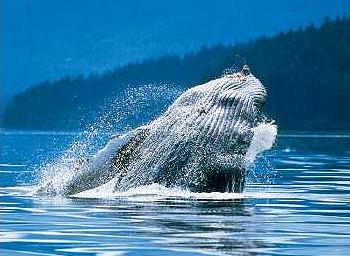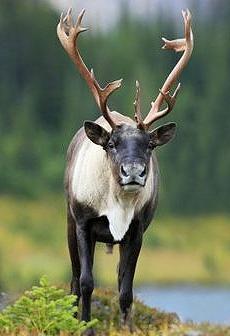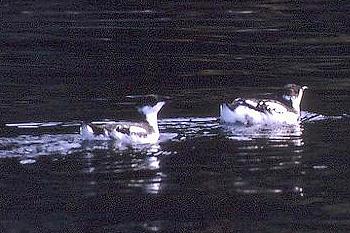 環保團體最近控告加拿大政府違背《瀕危物種法》(Species at Risk Act, SARA),使「北方門戶」油管計畫(Northern Gateway pipeline)及其路線危及野生動物生存。
環保團體最近控告加拿大政府違背《瀕危物種法》(Species at Risk Act, SARA),使「北方門戶」油管計畫(Northern Gateway pipeline)及其路線危及野生動物生存。
大衛鈴木基金會(David Suzuki Foundation)、加拿大綠色和平組織(Greenpeace Canada)、卑詩塞拉俱樂部(Sierra Club B. C.)、荒野委員會(Wilderness Committee)與自然視野組織(Wildsight)等五個團體,23日委由「環境正義組織」(Ecojustice)在溫哥華聯邦法庭提出訴訟。 這起訴訟質疑聯邦政府對於太平洋座頭鯨、尼查科白鱘(Nechako white sturgeon)、班海雀(marbled murrelet)與南方北美馴鹿(southern mountain caribou)等四個物種的復育政策,會受到輸油業大廠恩橋公司(Enbridge)的北方門戶油管計畫所影響。 這些物種所需的復育時間將超過瀕危物種法所規定的三年。
環保團體希望透過這次訴訟,要求法院迫使聯邦政府執行復育政策。該恢復策略是重要的第一步,以保護瀕危物種及其棲息地。
四個瀕危物種的棲息地會和擬興建之北方門戶管道路線衝突,並受到其施工及營運的影響。
北方門戶管道計畫乃由加拿大原油及液態油管商「恩橋公司」所執行,其將建構雙管系統從亞伯達省(Alberta)的Bruderheim到卑詩省的Kitimat。
東行管線將運送天然氣凝析油(natural gas condensate);而西行管線將從阿薩巴斯卡油田(Athabasca oil sands)運送瀝青混合物至沿海的Kitimat,並在此轉以油輪運往亞洲市場。
 由於管道將穿越部份傳統土地並威脅野生鮭魚的棲息地,北方門戶管道計畫因而遭到許多環保團體反對。2010年12月,不列顛哥倫比亞省有超過60個加拿大原住民族群,包括許多管道沿線的住民,簽署了一項聲明,反對該計畫。
由於管道將穿越部份傳統土地並威脅野生鮭魚的棲息地,北方門戶管道計畫因而遭到許多環保團體反對。2010年12月,不列顛哥倫比亞省有超過60個加拿大原住民族群,包括許多管道沿線的住民,簽署了一項聲明,反對該計畫。
環保團體都在關注恩橋公司眾多管路的洩漏風險,並正在起訴政府,企圖防止野生動物棲息地遭到破壞。
環保團體聲稱,聯邦政府藉由延遲瀕危物種的復育政策,以及選擇需要保育的關鍵地區,使得像恩僑公司北方門戶管道這類的大型計畫得以順利進行,快速地通過審查程序,而並沒有充分了解該計畫對野生動物極其棲息地的長期影響。
像北方馴鹿(boreal caribou)、蒼鷹(northern goshawk)、普通夜鷹(common nighthawk)、橄欖脅綠霸鶲(olive-sided flycatcher)以及加拿大鶯(Canada warbler)等物種,都因政府推遲保育政策而受到油管計畫影響。
表面上,瀕危物種法提出了一個合乎邏輯、科學的構架,以保護脆弱的物種,讓他們有機會生存和恢復族群。而環保團體卻表示,實際上,復育政策的推遲、辦別關鍵棲息地並加以保護的執行不力,都是政府的把戲。
聯 邦政府已推遲188種瀕危物種的復育政策,許多案例皆推遲了數年之久,甚至超過了瀕危物種法中規定的最後期限。目前,87個復育政策已逾期五年以上。
邦政府已推遲188種瀕危物種的復育政策,許多案例皆推遲了數年之久,甚至超過了瀕危物種法中規定的最後期限。目前,87個復育政策已逾期五年以上。
環境正義組織的律師Sean Nixon表示,未能落實瀕危物種法讓前述四個物種及其他加拿大各地的瀕危物種暴露在風險中。現在,是時候拿出些實際的作為,來保護野生動物的棲息地並復育他們的族群,不要讓政策繼續延宕下去。
Environmental groups are suing Canada, claiming failure to implement the Species at Risk Act endangers wildlife along the Northern Gateway pipeline and shipping route.
Ecojustice filed the litigation Tuesday in federal court in Vancouver, acting on behalf of five environmental groups: the David Suzuki Foundation, Greenpeace Canada, Sierra Club B.C., Wilderness Committee and Wildsight.
The lawsuit challenges the federal government’s years of delay in producing recovery strategies for four species that would be affected by the proposed Enbridge Northern Gateway project — the Pacific humpback whale, Nechako white sturgeon, marbled murrelet and southern mountain caribou.
The recovery strategy for each of these species is at least three years overdue under timelines mandated by the Species at Risk Act, SARA.
The groups seek a court order to force the federal government to release recovery strategies for the four species that are the subject of this litigation. These recovery strategies are an important first step in ensuring these endangered species have their habitat protected.
The habitat for all four species, which lies along the proposed pipeline and shipping route, would be impacted by the construction and operation of the Northern Gateway pipeline.
The Enbridge Northern Gateway Pipeline project is a proposal by Enbridge Inc., a Canadian crude oil and liquids pipeline company, to construct twin pipelines running from Bruderheim, Alberta, to Kitimat, British Columbia.
The eastbound pipeline would import natural gas condensate and the westbound pipeline would export bitumen from the Athabasca oil sands diluted with the condensate to the new marine terminal in Kitimat where it would be transported to Asian markets by oil tankers.
The Northern Gateway Pipeline proposal is opposed by many native groups, as the pipeline would traverse their traditional lands and threaten habitat for wild salmon. In December 2010, over 60 First Nations in British Columbia, including many along the proposed route, signed a declaration opposing the project.
Environmental organizations are concerned about Enbridge’s numerous pipeline spills and now are suing the government in an attempt to prevent destruction of wildlife habitat.
By delaying the recovery strategies for species at risk and thus identification of the critical habitat it must protect, the federal government is making it easier for big projects, like the Enbridge Northern Gateway pipeline, to speed through regulatory review without a full understanding of the long-term impacts on these wildlife species and their habitat, the plaintiff groups argue.
Other species at risk with delayed recovery strategies that will be impacted by the pipeline include: boreal caribou, northern goshawk (laingii subspecies), common nighthawk, olive-sided flycatcher, and the Canada warbler.
On paper, SARA presents a logical, scientifically sound framework for protecting vulnerable species and giving them a chance to survive and recover. But in practice, the groups contend, chronic delays in producing recovery strategies, identifying critical habitat and protecting that habitat once it has been identified is the government’s pattern.
The federal government has delayed completion of recovery strategies for 188 at-risk species; in many cases, these delays stretch years past the mandatory deadlines set out in SARA. Currently, 87 recovery strategies are more than five years overdue.
“Failure to implement SARA is putting these four species and all endangered species across Canada at further risk,” Nixon said. “It’s time to stop the delays and get on with the real work of protecting habitat and recovering our wildlife.”
全文及圖片詳見:ENS




